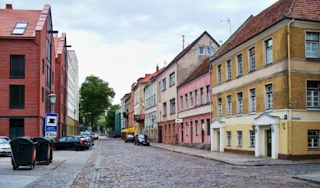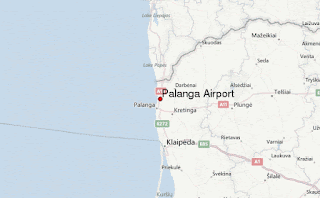Mother is Edith Waltraut Klemm, nee Redetzki. She last saw this 'home' 57 years ago as she fled the country with her sister, mother and a newborn baby, in front of rapidly advancing enemy Russian troops so close they heard artillery fire. Home is in the cities of Heydekrug and Groß Grabuppen in Memelland, East Prussia.
None of us even considered the possibility of ever visiting Memelland. I should have paid closer attention when family and friends told their stories, but it was so remote and not like a place I could ever visit. How quickly everything changed, the last fifty years erased, an entire ideology made obsolete overnight. No more tense border crossings, guard dogs, searches for decadent capitalist printed matter, costly visa applications, absurd registration formalities. No more hypocrisy about using barbed wire and mines are to keep out capitalists. In retrospect it all sounds so ridiculous now, doesn't it? Is that how things really were, the young wonder.
In spite of a dismal start at Metro, I'm excited with a real sense of adventure about this trip. The air of anticipation reminds me of trips in my younger days, the thrill of discovery and new experiences. That rush from uncertainty of what awaits. Uncertainty also makes me nervous at what awaits my mother.
First stop - Schiphol Airport in Amsterdam, a big cosmopolitan airport. People look so stylish as they walk briskly along brightly lit corridors. I feel schlumpy. Even the airport staff looks so efficient in their snappy outfits. After Metro 6 hours ago the contrast is stark. Now we deal with an unwritten law of Airport Travel – your connecting flight will be the furthest gate from where you landed. I guide mother through the maze of corridors peering above heads for clues on to finding our gate. Mom is able bodied but I do need to take her elbow and steer.
Finally we find our gate, get on a shuttle bus, go to another corridor, and then arrive at the new gate to wait. I make the decisions, checking signs, asking directions, carry the hand luggage and gently move Mom. She is a bit like a piece of extra baggage! I will say she’s very agreeable, doesn’t argue or contradict, but leaves it all in my hands which makes it easier. I don’t have to explain or clarify or argue, easier than our road trip. Fortunately I’m making the right choices and don’t have to backtrack.
Even though this is our first stop in European territory, a quick passport check suffices, luggage booked through. No security checks. Us Americans are, however, relegated to the long line of non-EU people. Oh how I long for the good old days when a U.S. passport entitled you to speedy transit past all the poor huddled masses clinging to hopes of entry. This Euroland thing doesn’t favor Americans. Maybe I should look into getting back my German citizenship so I can take the fast lane. When my parents took U.S. citizenship I slid through as a minor, and we were required to renounce previous country allegiances. No dual citizenship in those days; I feel cheated.
Next stop – Hamburg, Germany for the plane to Lithuania. Hamburg is a city I love to visit, good associations with this city. I selected this transit point instead of Berlin as on the return flight we'll take an extra night to stay with relatives. It's a long layover so Mom and I amble around the airport. Suddenly I hear someone calling across the concourse "Tante Edith!" Walking towards us across the broad expanse are two familiar people - my cousin Irmgard and husband Alfred. So totally unexpected! Irmgard was my father’s favorite niece, and I became close during my years in Germany. (Many years later I learned she was the first choice for my godmother, but that's another story.) What a delight! They decided to surprise us on our stopover even though they knew we were stopping on our return trip. They're both retired but the airport is quite a drive from their home. Warm hugs and welcomes all around.
First gotta work getting our German up to speed. Up the stairs we go to a cafeteria on the mezzanine with a great view across the main concourse. The food service is very posh with a heavenly assortment of food and drink - beer, wine, champagne. Of course, we’re clearly in Europe now!
Here the staff is dressed in crisp white shirts, black vests, pants and bow ties. They are foreign, i.e. non-German, but classier than hometown folks at Metro. What a great variety of foods to choose from, it’s hard to decide. We didn’t really want to eat but can't pass this up. Yes, prices are high like any airport and costly like everything in Europe. Maybe the problem with food in America is precisely that it is too cheap, so we treat it like garbage.
It comes time to part from Irmgard and Alfred to catch our next flight. Hugs and farewells. "We'll see you in in ten days!", ten days from today Sept 1, 2001.
Back to our gate to board Air Lithuania for the flight on to Palanga right on the Baltic Sea. I imagined that Air Lithuania would be pretty much on par with Aeroflot, the infamous Russian airline, in terms of outdated planes, non-existent service and generally the category of fly at your own risk; maybe even a chicken or goat onboard. Will we make it alive? Is there a real pilot flying the plane? Getting nervous!














